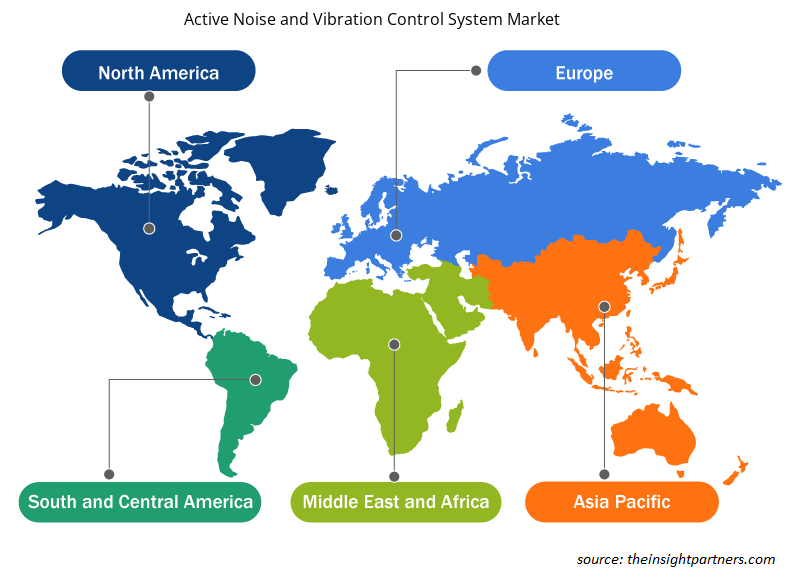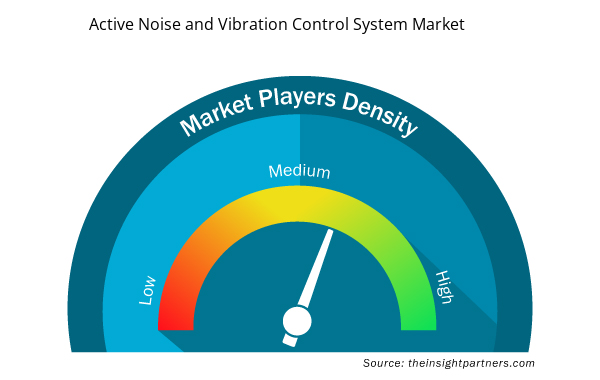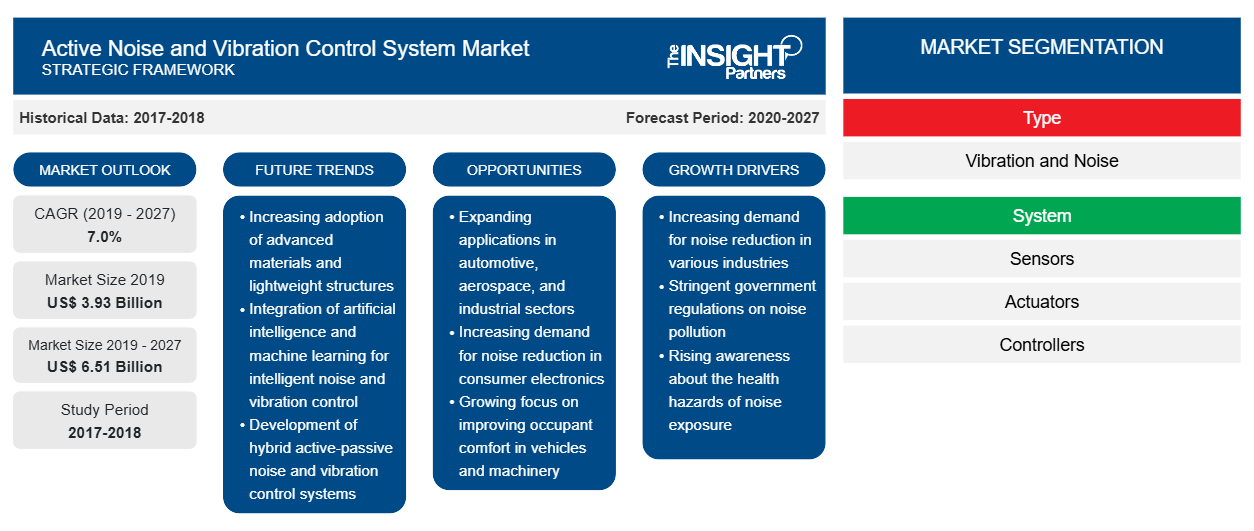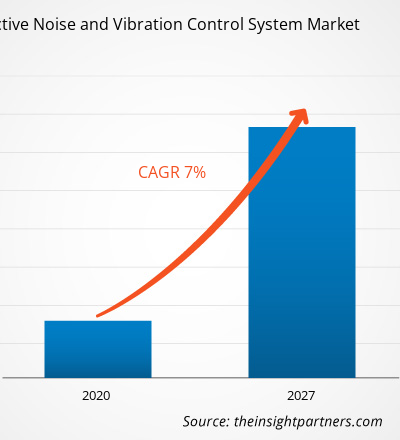In Bezug auf den Umsatz wurde der globale Markt für aktive Lärm- und Vibrationskontrollsysteme im Jahr 2019 auf 3.925,61 Millionen US-Dollar geschätzt und soll bis 2027 6.505,28 Millionen US-Dollar erreichen; im Prognosezeitraum von 2020 bis 2027 dürfte er mit einer durchschnittlichen jährlichen Wachstumsrate von 7,0 % wachsen.
Der Markt für aktive Lärm- und Vibrationskontrollsysteme ist grob in fünf große Regionen unterteilt: Nordamerika, Europa, APAC, MEA und SAM. Die Luft- und Raumfahrt- und Verteidigungsindustrie in Nordamerika ist ausgereift, da es dort eine große Anzahl von Flugzeugherstellern gibt und das US-Verteidigungsministerium sie kontinuierlich unterstützt. Die Nachfrage nach fortschrittlichen Technologien ist in der Region enorm, und alle oben genannten Endnutzer sind sich neuerer Technologien bestens bewusst. Das US-Verteidigungsministerium investiert kontinuierlich Zeit und Geld in die Weiterentwicklung der bestehenden Flotte und die Entwicklung robuster Technologie für gepanzerte Bodenfahrzeuge sowie Seeschiffe mit dem Ziel, eine einsatzbereite Truppe aufrechtzuerhalten. Die Präsenz einer großen Anzahl von Herstellern aktiver Lärm- und Vibrationskontrollsysteme in der Region unterstützt die ständig steigende Nachfrage, was wiederum den Markt für aktive Lärm- und Vibrationskontrollsysteme ankurbelt
Passen Sie diesen Bericht Ihren Anforderungen an
Sie erhalten kostenlos individuelle Anpassungen an jedem Bericht, einschließlich Teilen dieses Berichts oder einer Analyse auf Länderebene, eines Excel-Datenpakets sowie tolle Angebote und Rabatte für Start-ups und Universitäten.
- Holen Sie sich die wichtigsten Markttrends aus diesem Bericht.Dieses KOSTENLOSE Beispiel umfasst eine Datenanalyse von Markttrends bis hin zu Schätzungen und Prognosen.
Markteinblicke – Markt für aktive Geräusch- und Vibrationskontrollsysteme
Zunehmender Einsatz aktiver Systeme im Schienenfahrzeugbau
Die Eisenbahnindustrie wächst weltweit seit Jahren beträchtlich, und zahlreiche technologische Fortschritte sorgen für sicherere und komfortablere Fahrten. Die Eisenbahnausrüstung (Drehgestelle und Lastwagen) ist starken vertikalen Vibrationen und Lärm ausgesetzt, die während des Betriebs verschiedene Risiken erhöhen. Um Vibrationen und Lärm zu unterdrücken, konzentrieren sich mehrere Hersteller von Eisenbahnausrüstung zunehmend auf die Einführung von Lärm- und Vibrationskontrollsystemen. Die passive Lärm- und Vibrationskontrolle ist bei den Eisenbahnherstellern weit verbreitet, da diese Systeme es den Herstellern ermöglichen, ihren Kunden sicherere und komfortablere Produkte anzubieten. Die Mehrzahl der passiven Systeme sind jedoch hydraulische Systeme, und in den letzten Jahren legen die Hersteller von Eisenbahnausrüstung den Schwerpunkt auf elektronisch/elektrisch gesteuerte Systeme, was die zunehmende Attraktivität aktiver Lärm- und Vibrationssysteme widerspiegelt. Ein aktives System mit Trägheitsmassenaktuatoren, die an den Drehgestellen montiert sind, kann niederfrequente Geräusche und Vibrationen in den Abteilen kontrollieren. Darüber hinaus sind die aktiven Systeme im Allgemeinen elektromechanische Systeme, die bei den Herstellern von Eisenbahnausrüstung immer beliebter werden. Dieser Faktor dürfte zu einer deutlich höheren Nachfrage nach aktiven Systemen bei den Herstellern von Eisenbahnausrüstung führen und so den Markt für aktive Lärm- und Vibrationskontrollsysteme ankurbeln.
Einblicke in das Typsegment
Nach Typ betrachtet dominierte das Vibrationssegment 2019 den globalen Markt für aktive Lärm- und Vibrationskontrollsysteme. Aktive Vibrationskontrollsysteme sind Isolationssysteme, die dynamisch auf externe Vibrationen reagieren. Diese Systeme werden verwendet, um Reibung zu reduzieren und Vibrationen in beweglichen oder statischen Maschinen zu kontrollieren.
Einblicke in Systemsegmente
Basierend auf dem System dominierte das Aktuatorensegment 2019 den globalen Markt für aktive Geräusch- und Vibrationskontrollsysteme. Aktuatoren sind in die aktiven Geräusch- und Vibrationskontrollsysteme integriert, um verschiedene Kräfte innerhalb der Anlage zu steuern und so den Gesamtbetrieb zu verbessern. Diese Aktuatoren verwenden verschiedene Technologien wie Piezoelektrizität, Elektrodynamik und hydraulische Elektrodynamik.
Einblicke in die Branchensegmente
Branchenbezogen dominierte das Luft- und Raumfahrtsegment 2019 den globalen Markt für aktive Lärm- und Vibrationskontrollsysteme. Die Luft- und Raumfahrtindustrie floriert seit Jahren exponentiell mit einer großen Anzahl an Produktionen und Lieferungen. Die Flugzeughersteller und Komponentenhersteller sehen sich einem erheblichen Druck seitens der Endverbraucher des kommerziellen Luftfahrtsektors ausgesetzt, mehr Flugzeuge auszuliefern.
Die Marktteilnehmer konzentrieren sich auf Produktinnovationen und -entwicklungen, indem sie fortschrittliche Technologien und Funktionen in ihre Produkte integrieren, um mit der Konkurrenz mithalten zu können.
- Im Jahr 2019 gab Creo Dynamics die Übernahme der Mehrheitsbeteiligung durch Faurecia bekannt, um die Kompetenz des Unternehmens im Bereich aktive Geräuschkontrolle und Akustik im Automobilbereich mit Faurecia zu bündeln und einzigartige neue Lösungen für den Markt zu entwickeln.
- Im Jahr 2019 gab Terma bekannt, dass es einen Vertrag mit UASF zur Bereitstellung von 3D-Audiosystemen für A-10-Flugzeuge unterzeichnet hat.
- Im Jahr 2018 gab die Vicoda GmbH bekannt, dass sie abgestimmte Massendämpfer für Fußgängerbrücken in Gent geliefert hat, um von Fußgängern verursachte Vibrationen zu kontrollieren und zu reduzieren und den Komfortanforderungen durch die Verhinderung des „Lock-in“-Effekts gerecht zu werden.
Der globale Markt für aktive Lärm- und Vibrationskontrollsysteme ist wie folgt segmentiert:
Regionale Einblicke in den Markt für aktive Geräusch- und Vibrationskontrollsysteme
Die regionalen Trends und Faktoren, die den Markt für aktive Geräusch- und Vibrationskontrollsysteme während des gesamten Prognosezeitraums beeinflussen, wurden von den Analysten von Insight Partners ausführlich erläutert. In diesem Abschnitt werden auch die Marktsegmente und die Geografie für aktive Geräusch- und Vibrationskontrollsysteme in Nordamerika, Europa, im asiatisch-pazifischen Raum, im Nahen Osten und Afrika sowie in Süd- und Mittelamerika erörtert.

- Erhalten Sie regionale Daten zum Markt für aktive Geräusch- und Vibrationskontrollsysteme
Umfang des Marktberichts zum aktiven Geräusch- und Vibrationskontrollsystem
| Berichtsattribut | Details |
|---|---|
| Marktgröße im Jahr 2019 | 3,93 Milliarden US-Dollar |
| Marktgröße bis 2027 | 6,51 Milliarden US-Dollar |
| Globale CAGR (2019 - 2027) | 7,0 % |
| Historische Daten | 2017-2018 |
| Prognosezeitraum | 2020–2027 |
| Abgedeckte Segmente | Nach Typ
|
| Abgedeckte Regionen und Länder | Nordamerika
|
| Marktführer und wichtige Unternehmensprofile |
|
Marktteilnehmerdichte: Der Einfluss auf die Geschäftsdynamik
Der Markt für aktive Geräusch- und Vibrationskontrollsysteme wächst rasant, angetrieben von der steigenden Nachfrage der Endnutzer aufgrund von Faktoren wie sich entwickelnden Verbraucherpräferenzen, technologischen Fortschritten und einem größeren Bewusstsein für die Vorteile des Produkts. Mit steigender Nachfrage erweitern Unternehmen ihr Angebot, entwickeln Innovationen, um die Bedürfnisse der Verbraucher zu erfüllen, und nutzen neue Trends, was das Marktwachstum weiter ankurbelt.
Die Marktteilnehmerdichte bezieht sich auf die Verteilung von Firmen oder Unternehmen, die in einem bestimmten Markt oder einer bestimmten Branche tätig sind. Sie gibt an, wie viele Wettbewerber (Marktteilnehmer) in einem bestimmten Marktraum im Verhältnis zu seiner Größe oder seinem gesamten Marktwert präsent sind.
Die wichtigsten Unternehmen auf dem Markt für aktive Geräusch- und Vibrationskontrollsysteme sind:
- Honeywell International Inc.
- Fabreeka International Inc.
- Moog Inc.
- Parker Hannifin Corporation
- Faurecia Creo AB
Haftungsausschluss : Die oben aufgeführten Unternehmen sind nicht in einer bestimmten Reihenfolge aufgeführt.

- Erhalten Sie einen Überblick über die wichtigsten Akteure auf dem Markt für aktive Geräusch- und Vibrationskontrollsysteme
Markt für aktive Geräusch- und Vibrationskontrollsysteme – nach Typ
- Vibration
- Lärm
Markt für aktive Geräusch- und Vibrationskontrollsysteme – nach System
- Sensoren
- Aktuatoren
- Controller
- Dämpfer
Markt für aktive Geräusch- und Vibrationskontrollsysteme – nach System
- Luft- und Raumfahrt
- Starrflügel
- Drehflügler
- Verteidigung
- Bodenfahrzeug
- Marineschiffe
- Eisenbahn
- Allgemeine Industrie
- Herstellung
- Energie & Strom
Markt für aktive Geräusch- und Vibrationskontrollsysteme – nach System
- Sensoren
- Aktuatoren
- Controller
- Dämpfer
Markt für aktive Geräusch- und Vibrationskontrollsysteme – nach Regionen
- Nordamerika
- UNS
- Kanada
- Mexiko
- Europa
- Frankreich
- Deutschland
- Italien
- Vereinigtes Königreich
- Russland
- Restliches Europa
- Asien-Pazifik (APAC)
- China
- Indien
- Südkorea
- Japan
- Australien
- Restlicher Asien-Pazifik-Raum
- Naher Osten und Afrika (MEA)
- Südafrika
- Saudi-Arabien
- Vereinigte Arabische Emirate
- Rest von MEA
- Südamerika (SAM)
- Brasilien
- Rest von SAM
Markt für aktive Geräusch- und Vibrationskontrollsysteme – Unternehmensprofile
- FABREEKA
- Honeywell International Inc.
- HUTCHINSON
- Terma A/S
- Moog Inc.
- Parker Hannifin
- Faurecia Creo AB
- Supashock
- Trelleborg AB
- VICODA GmbH
- Historische Analyse (2 Jahre), Basisjahr, Prognose (7 Jahre) mit CAGR
- PEST- und SWOT-Analyse
- Marktgröße Wert/Volumen – Global, Regional, Land
- Branche und Wettbewerbsumfeld
- Excel-Datensatz



Report Coverage
Revenue forecast, Company Analysis, Industry landscape, Growth factors, and Trends

Segment Covered
This text is related
to segments covered.

Regional Scope
North America, Europe, Asia Pacific, Middle East & Africa, South & Central America

Country Scope
This text is related
to country scope.
Häufig gestellte Fragen
The aerospace and defense industry in North America is matured with the existence of a large number of aircraft manufacturers, and continuous support from the US DoD. The demand for advanced technologies is tremendous in the region, with all the end users mentioned above are well aware of newer technologies. The US DoD continuously invests time and amounts towards the advancements of existing fleet and development of robust technology ground armored vehicles as well as marine vessel with an objective to maintain a mission-ready force. The presence of a large number of active noise and vibration control system manufacturers in the region is supporting the ever-rising demand, which is thereby boosting the active noise and vibration control system market.
The actuators segment capture maximum share in active noise and vibration control system market. The actuators in the active vibration control system are used to reduce vibrations produced in the machines; however, they are also used as shakers in the active isolation system. These actuators are connected to the sensors and are available in the same number, orientation, and location as that of the sensors The actuators reduce the incoming vibrations, thereby permitting the load on the intact system.
The aviation industry is maturing at a rapid rate over the years, recording a significant number of production and deliveries of aircraft (commercial and military) fleet (fixed wing and rotary wing). However, the aircraft manufacturers are heavily challenged on decreasing the overall weight of any aircraft. The active noise and vibration control systems offer significant weight reduction capability as compared with its passive counterparts. This factor is increasing the interest among the end users to adopt the technology.
Trends and growth analysis reports related to Aerospace and Defense : READ MORE..
The List of Companies - Active Noise and Vibration Control System Market
- Honeywell International Inc.
- Fabreeka International Inc.
- Moog Inc.
- Parker Hannifin Corporation
- Faurecia Creo AB
- Supashock Advanced Technologies
- Trellborg AB
- Hutchinson
- Terma A/S
- Vicoda GmbH
The Insight Partners performs research in 4 major stages: Data Collection & Secondary Research, Primary Research, Data Analysis and Data Triangulation & Final Review.
- Data Collection and Secondary Research:
As a market research and consulting firm operating from a decade, we have published and advised several client across the globe. First step for any study will start with an assessment of currently available data and insights from existing reports. Further, historical and current market information is collected from Investor Presentations, Annual Reports, SEC Filings, etc., and other information related to company’s performance and market positioning are gathered from Paid Databases (Factiva, Hoovers, and Reuters) and various other publications available in public domain.
Several associations trade associates, technical forums, institutes, societies and organization are accessed to gain technical as well as market related insights through their publications such as research papers, blogs and press releases related to the studies are referred to get cues about the market. Further, white papers, journals, magazines, and other news articles published in last 3 years are scrutinized and analyzed to understand the current market trends.
- Primary Research:
The primarily interview analysis comprise of data obtained from industry participants interview and answers to survey questions gathered by in-house primary team.
For primary research, interviews are conducted with industry experts/CEOs/Marketing Managers/VPs/Subject Matter Experts from both demand and supply side to get a 360-degree view of the market. The primary team conducts several interviews based on the complexity of the markets to understand the various market trends and dynamics which makes research more credible and precise.
A typical research interview fulfils the following functions:
- Provides first-hand information on the market size, market trends, growth trends, competitive landscape, and outlook
- Validates and strengthens in-house secondary research findings
- Develops the analysis team’s expertise and market understanding
Primary research involves email interactions and telephone interviews for each market, category, segment, and sub-segment across geographies. The participants who typically take part in such a process include, but are not limited to:
- Industry participants: VPs, business development managers, market intelligence managers and national sales managers
- Outside experts: Valuation experts, research analysts and key opinion leaders specializing in the electronics and semiconductor industry.
Below is the breakup of our primary respondents by company, designation, and region:

Once we receive the confirmation from primary research sources or primary respondents, we finalize the base year market estimation and forecast the data as per the macroeconomic and microeconomic factors assessed during data collection.
- Data Analysis:
Once data is validated through both secondary as well as primary respondents, we finalize the market estimations by hypothesis formulation and factor analysis at regional and country level.
- Macro-Economic Factor Analysis:
We analyse macroeconomic indicators such the gross domestic product (GDP), increase in the demand for goods and services across industries, technological advancement, regional economic growth, governmental policies, the influence of COVID-19, PEST analysis, and other aspects. This analysis aids in setting benchmarks for various nations/regions and approximating market splits. Additionally, the general trend of the aforementioned components aid in determining the market's development possibilities.
- Country Level Data:
Various factors that are especially aligned to the country are taken into account to determine the market size for a certain area and country, including the presence of vendors, such as headquarters and offices, the country's GDP, demand patterns, and industry growth. To comprehend the market dynamics for the nation, a number of growth variables, inhibitors, application areas, and current market trends are researched. The aforementioned elements aid in determining the country's overall market's growth potential.
- Company Profile:
The “Table of Contents” is formulated by listing and analyzing more than 25 - 30 companies operating in the market ecosystem across geographies. However, we profile only 10 companies as a standard practice in our syndicate reports. These 10 companies comprise leading, emerging, and regional players. Nonetheless, our analysis is not restricted to the 10 listed companies, we also analyze other companies present in the market to develop a holistic view and understand the prevailing trends. The “Company Profiles” section in the report covers key facts, business description, products & services, financial information, SWOT analysis, and key developments. The financial information presented is extracted from the annual reports and official documents of the publicly listed companies. Upon collecting the information for the sections of respective companies, we verify them via various primary sources and then compile the data in respective company profiles. The company level information helps us in deriving the base number as well as in forecasting the market size.
- Developing Base Number:
Aggregation of sales statistics (2020-2022) and macro-economic factor, and other secondary and primary research insights are utilized to arrive at base number and related market shares for 2022. The data gaps are identified in this step and relevant market data is analyzed, collected from paid primary interviews or databases. On finalizing the base year market size, forecasts are developed on the basis of macro-economic, industry and market growth factors and company level analysis.
- Data Triangulation and Final Review:
The market findings and base year market size calculations are validated from supply as well as demand side. Demand side validations are based on macro-economic factor analysis and benchmarks for respective regions and countries. In case of supply side validations, revenues of major companies are estimated (in case not available) based on industry benchmark, approximate number of employees, product portfolio, and primary interviews revenues are gathered. Further revenue from target product/service segment is assessed to avoid overshooting of market statistics. In case of heavy deviations between supply and demand side values, all thes steps are repeated to achieve synchronization.
We follow an iterative model, wherein we share our research findings with Subject Matter Experts (SME’s) and Key Opinion Leaders (KOLs) until consensus view of the market is not formulated – this model negates any drastic deviation in the opinions of experts. Only validated and universally acceptable research findings are quoted in our reports.
We have important check points that we use to validate our research findings – which we call – data triangulation, where we validate the information, we generate from secondary sources with primary interviews and then we re-validate with our internal data bases and Subject matter experts. This comprehensive model enables us to deliver high quality, reliable data in shortest possible time.


 Holen Sie sich ein kostenloses Muster für diesen Bericht
Holen Sie sich ein kostenloses Muster für diesen Bericht